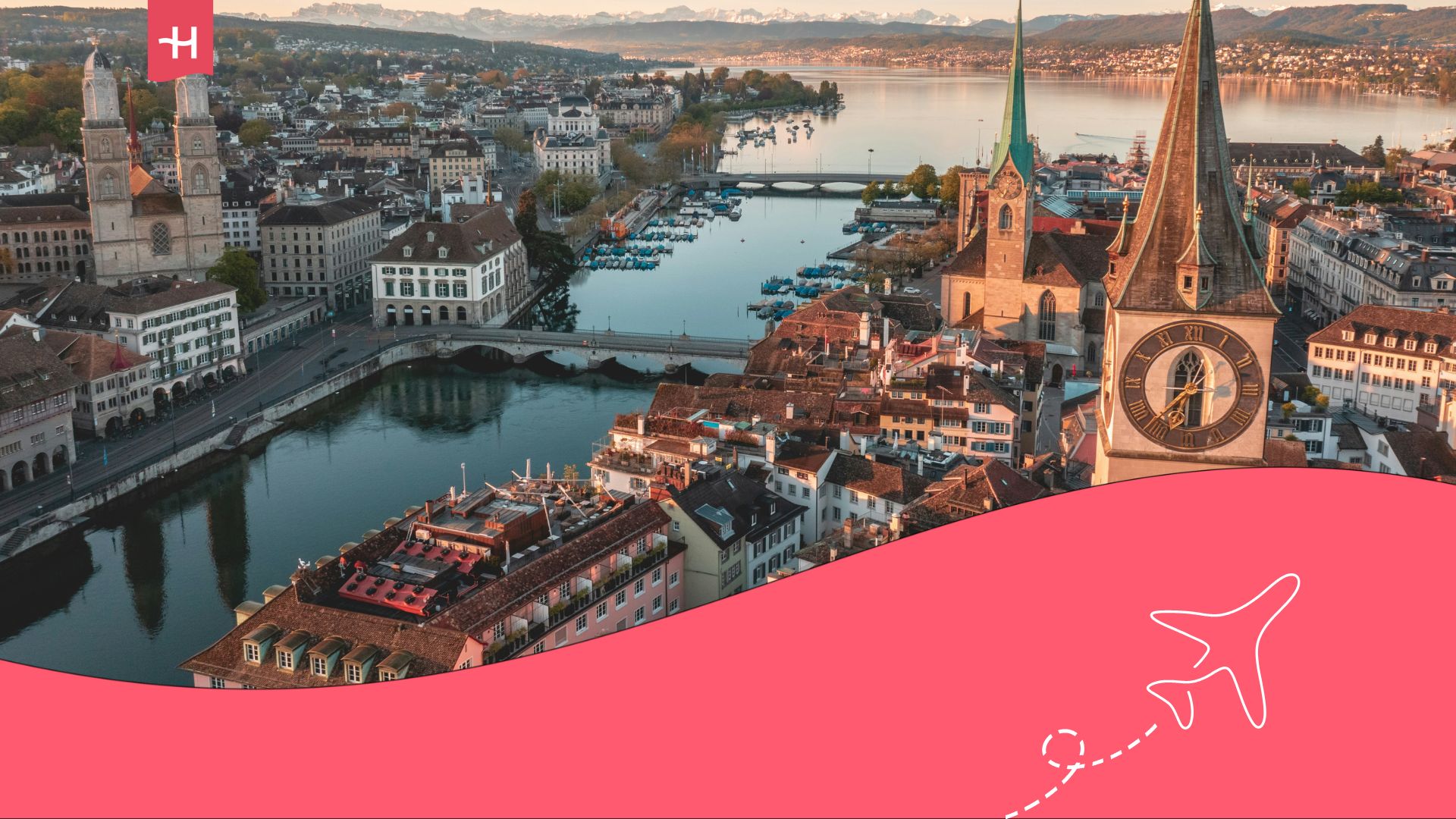Work in the Netherlands: Requirements and opportunities
Work in the Netherlands: requirements, most in-demand jobs, salaries, and where to find opportunities as a foreigner.
Working in the Netherlands doesn’t just mean earning a good salary or living among canals, bikes, and tulips. It also means joining a direct, organised, and open work culture where quality of life and balance between work and personal time are priorities. Whether you’re planning to move or just exploring job options from abroad, this guide is for you.
Here, you’ll find everything you need to take the leap: Real benefits of working in the Netherlands, legal requirements, practical tips to start well, accessible jobs for foreigners, and sectors with high demand. Let’s go step by step so you can make confident, informed decisions.
Advantages of working in the Netherlands
Working in the Netherlands offers many benefits beyond salary or location. It’s a mix of advantages that make many foreigners choose this country for a new professional and personal chapter. Here are the most important ones:
- High and stable quality of life: In the Netherlands, living well is standard. Cities are well connected with public transport, plenty of green spaces, and efficient public services. You’ll also enjoy a healthy work-life balance.
- Professional and direct work environment: Efficiency, clarity, and respect for others’ time matter here. That means fewer endless meetings and better results. People usually leave work on time and don’t stay glued to their computers after hours.
- Competitive salaries and social benefits: Taxes may look high, but the system gives back: Healthcare, education, public transport, paid leave… The minimum wage ranks among Europe’s highest, and many sectors pay well even when you’re starting out.
- Opportunities for foreigners: The Dutch labour market is very open. Sectors like technology, logistics, healthcare, and engineering actively seek international talent. Many companies operate in English, so Dutch isn’t always required from day one.
- International and tolerant atmosphere: Cities such as Amsterdam, Rotterdam, and Utrecht are truly multicultural. It’s easy to meet people from around the world, and there are support networks and communities that help you adapt quickly.
- Safety and economic stability: Living in the Netherlands brings peace of mind. It’s a safe, well-organised country with a strong economy. That means less uncertainty and better long-term planning.
Requirements for working in the Netherlands
Before sending your CV or applying for jobs, you must understand the basic legal requirements for working in the Netherlands. Some depend on your nationality, but these general points will help you know what you need to start.

- Residence and work permit: If you are a citizen of the European Union or the European Economic Area, you can work in the Netherlands without the need for a special permit. Others need a work visa or residence permit. Options include permits for highly skilled migrants, specific job programmes, or Working Holiday visas, depending on agreements between countries.
- Employment contract or job offer: To apply for a work permit, you usually need a formal job offer. In most cases, the hiring company starts the process and sponsors your application.
- Municipal registration and BSN number: Once in the Netherlands, register with your local city hall (Gemeente) to get your BSN (Burger Service Nummer). You’ll need it to work, open a bank account, or access healthcare.
- Mandatory health insurance Once you settle and start working, you must get Dutch basic health insurance. Even if you already have one abroad, Dutch coverage is legally required to access healthcare.
- Language level (depends on the job): Many companies work in English, especially in tech, research, or startups. However, Dutch is required for roles in healthcare, education, and customer service. Learning Dutch opens doors both professionally and socially.
- Validated qualifications (if applicable): Regulated professions like medicine, nursing, or law may need official validation. For non-regulated jobs, proven experience and education on your CV are usually enough.
Tips for starting work in the Netherlands
Working abroad always brings a learning curve. With some preparation, many things become easier. These tips will help you adapt smoothly, both personally and professionally:
- Get internet from day one: Staying connected from the start makes a huge difference. You can use maps, contact your employer or landlord, book transport, or let your family know you’ve arrived. Try Holafly’s monthly plans for unlimited internet in the Netherlands — no local SIMs or hidden fees. Perfect for your first months.
- Prepare a local-style CV: Dutch CVs are clear, direct, and brief. Avoid long texts or filler phrases. Go straight to your education, experience, and achievements. Write it in English or Dutch, depending on the job. Keep your LinkedIn profile updated too.
- Take advantage of support networks for foreigners: There are many groups on social media, forums, and platforms like Meetup where you can connect with other expatriates, share advice, and even find job opportunities. You’ll share advice, get local recommendations, and maybe even find job leads. A support network can be invaluable.
- Understand the Dutch labour system: Research your contract, taxes, social security, and rights. Rules are clear, and companies are formal, but arriving informed saves you stress.
- Learn basic Dutch: You can start working in English, but speaking some Dutch helps with emails, conversations, and integration. Many free or subsidised courses exist online and locally.
- Have some savings for the start: Even if you get a job quickly, it’s possible that the first payment may take a few weeks. First payments may take weeks, and rentals often require deposits plus the first month upfront. A small financial cushion keeps you relaxed during the transition.
Types of jobs in the Netherlands for foreigners
The Dutch job market welcomes international professionals, especially in sectors facing skill shortages or seasonal demand. Depending on your background and language, several options exist. Here are the most common ones:

- Technology and software development: One of the most open fields for foreign talent. Tech firms, startups, and multinationals in Amsterdam, Eindhoven, and Rotterdam often work in English, so Dutch isn’t mandatory initially. Many companies operate in English, so Dutch isn’t always required from day one.
- Logistics and transport: The Netherlands is a European logistics hub, with Rotterdam’s port and Schiphol Airport among the continent’s biggest. Practical experience often matters more than language.
- Healthcare and care work: Nursing, physiotherapy, and elderly care are in high demand. Most roles require fluent Dutch and sometimes qualification validation.
- Hospitality and tourism: Amsterdam, Utrecht, and Maastricht attract millions of visitors. There’s constant demand for waiters, cooks, receptionists, and cleaners. Fluent English and motivation usually suffice.
- Agriculture and seasonal work: Spring and summer bring openings in flower, fruit, and vegetable harvesting. These short-term jobs rarely need Dutch or experience — ideal for quick income or a first step.
- Customer support and call centres: Global companies seek native speakers of Spanish, English, or other languages. Many positions are remote or hybrid, and Dutch isn’t always required.
Most in-demand jobs for foreigners in the Netherlands
The Netherlands has faced a shortage of professionals in several fields for years. This opens doors for foreigners who know where demand lies. These are currently the most sought-after roles:
- IT and data specialists: Companies are looking for profiles with knowledge in data science, cloud computing, DevOps, artificial intelligence, and cybersecurity. Programmes exist to attract foreign tech talent with simplified residence permits.
- Engineers: Civil, mechanical, electrical, and environmental engineers are highly valued, especially in industrial and energy sectors. Experience abroad increases your chances.
- Education and language teachers: Schools and academies seek teachers for secondary education and international programmes. English, Spanish, French, and German teachers are in high demand.
- Healthcare professionals: Beyond nursing, there’s need for lab technicians, caregivers, therapists, and psychologists. Some institutions help foreigners learn Dutch for integration.
- Skilled technicians: Electricians, plumbers, welders, and installers have great prospects. The green transition creates ongoing demand in energy efficiency.
- Multilingual roles: If you speak several languages, you’ll find jobs in support, sales, or HR. Multinationals in the Netherlands often hire native speakers for European customer service teams.
Salaries and cost of living in the Netherlands
Salaries in the Netherlands are competitive and appealing for foreign professionals. The minimum wage in 2025 is about €2,070 ($2,260) gross per month. With experience in technology, healthcare, or engineering, you can expect €2,500–5,500 ($2,730–6,000) monthly, depending on your role and company. Logistics, hospitality, and technical jobs usually pay €2,000–3,500 ($2,180–3,820) gross, enough for a comfortable life with smart budgeting.
The cost of living is high, especially in Amsterdam or Utrecht. A single person spends around €1,500–2,000 ($1,640–2,180) monthly, including rent, food, health insurance, and transport. Renting a room costs €800–1,100 ($870–1,200), and groceries average about €300 ($330) per month if you cook at home.
If you’re relocating, come with savings to cover the first months. Having a reliable data plan helps, too. With a Holafly eSIM for the Netherlands, you’ll stay connected from landing — no Wi-Fi dependency or SIM purchases needed.
Important: If you are a frequent traveler and want to stay connected without worrying about expensive roaming or looking for a new SIM at every destination, Holafly’s subscription plans are for you. With a single eSIM, enjoy internet in more than 170 countries for a fixed price and no surprises on your bill. Travel without limits and connect easily and securely! 🚀🌍

Where to find job opportunities in the Netherlands
Job hunting in the Netherlands may seem challenging at first, but digital tools make it easier. Most applications happen online, and you can apply before arriving. These are the most useful platforms:
- Indeed.nl: One of the country’s largest portals. Search by city, contract type, or profession. It’s ideal for international candidates.
- LinkedIn: Widely used by Dutch companies to post jobs and find talent. It’s perfect for networking directly with recruiters.
- Glassdoor.nl: Offers job listings plus employee reviews, salary ranges, and insights into Dutch companies. Useful for applying with clearer information.
- Nationale Vacaturebank: A traditional Dutch platform with vacancies in all sectors. Most listings are in Dutch, but many include English options.
- Intermediair.nl: Focused on professionals with university degrees. Ideal for technical, managerial, or specialist roles.
- Undutchables.nl: Tailored for non-Dutch speakers. Lists English-speaking jobs and supports expats’ integration.
- IamExpat.nl – Jobs: Designed for the international community. Publishes English vacancies in marketing, tech, engineering, and healthcare.
- Adams Multilingual Recruitment: An agency specialising in international profiles. They work with firms seeking English, Spanish, or German speakers.
- Octagon Professionals: Partners with European institutions and companies in the Netherlands. Offers opportunities in IT, science, and consultancy.
- UWV Werk.nl: The Dutch public employment service. Provides free career advice, training programmes, and job search tools.
Frequently asked questions about working in the Netherlands
It depends on your nationality. EU citizens can work freely. Non-EU citizens need a residence and work permit, usually processed by their Dutch employer.
Yes, especially in sectors like tech, logistics, tourism, or customer service at international firms. However, learning Dutch opens many more opportunities and simplifies daily life.
The minimum salary is around €2,070 ($2,260) gross per month, but earnings vary by field. In tech, healthcare, or engineering, salaries range between €2,500 and €5,500 ($2,730–6,000) gross monthly.
Yes, you usually need a formal job offer from a registered Dutch company that sponsors your application.
Register at your city’s town hall (Gemeente) and request your BSN number. You’ll need it to work, open a bank account, and access healthcare.





 Language
Language 


















 No results found
No results found







